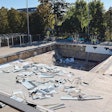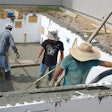I first became curious about the growing influence of “regulations” on our local pool building activities this year when my husband was building a pool in an area in which we rarely work. The clients were excited about the design, and then we found out the rather tight property had “too much concrete” already built on it according to the local regulations. We had to remove an existing concrete area and rework the pool and landscape design to include pave stones instead of solid concrete.
We had dealt with this kind of situation before, but this was even more onerous due to the extent of the regulations in this particular subdivision. After we had already gotten some stone on the site and were in the process of laying it, the inspector came by and informed us we had to change the base material AND the stones themselves — because water must not only permeate between the stones, but the stones themselves had to be “permeable.”
We handled the issues and went on and finished the pool, but I began to wonder where all this “sustainability” and “permeability” regulation was coming from and began to do a little research. To be frank, what I found kind of shocked me. As I dug a little deeper into these terms, I found that rules such as this were not local in nature, but went all the way to international standards being pushed by the United Nations on a worldwide basis.
There is a two-decade old plan called “Agenda 21” for global “Sustainable Development” that came from the United Nations and evidently was agreed to back in 1992 by President George H.W. Bush. It was expanded with an executive order signed by President Clinton in 1995, creating a “Presidential Council on Sustainable Development”.
As I understand this, (and I’m oversimplifying, I’m sure) the UN is creating world-wide regulations on land use through an organization called the International Council of Local Environmental Issues (ICLEI). Over six hundred cities, towns and counties in America have become members of the council and embraced its regulatory imperatives.
At the same time, the ICC, or International Code Council, is developing standards INTERNATIONALLY for pool building. Our industry is heavily involved in developing these standards by which we all must build swimming pools.
I have mixed feelings about this. As a sixth generation Texan, I sort of feel like my land is MY LAND, and I should pretty much be able to do with it anything I darn well please. Of course, I choose to live on six and a half acres in the country surrounded by neighbors who live here because we all feel much the same way.
(For instance, a few years ago the local electric company opted to put a right of way they were seeking ACROSS from Aunt Jo’s land next door rather than ON her property after dealing with her reaction to that nifty idea — “Aunt Jo”, now deceased, was a feisty old lady who wasn’t our aunt, but everybody called her that, and she was fiercely protective of her property, her opinions and her values about things. I got along with her just fine, but I am a tad on the independent side of things myself and have a local rather than global take on the world in general.)
However, in talking to other pool builders who do commercial work especially, in several different locations, some standardization in building codes can be a desirable thing, too, and all of us want high quality in building practices.
I just have a great deal of distrust in voluntarily giving up freedoms to “regulators”, especially when they are not my local neighbors, in order to impose dubiously “scienced”( yes, I made up that word) goals such as “sustainability” and impose on my clients unrealistic demands that infringe on their right to decide what is built on their private property. I think we need to look at these pending “international” standards with a skeptical eye, and go mighty slow as an industry down another road paved with good intentions. I always heard that road led to some unintended consequences. What do you think?






































